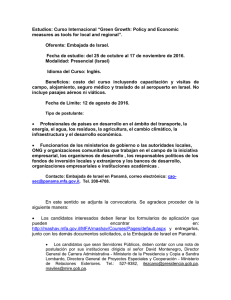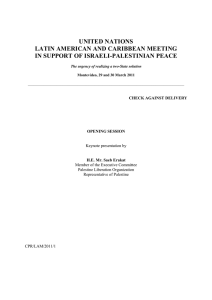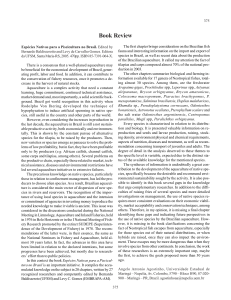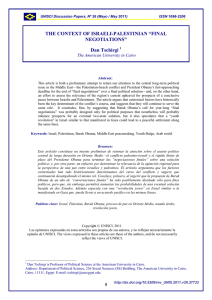Intensive Aquaculture Production - Israeli Missions Around The World
Anuncio
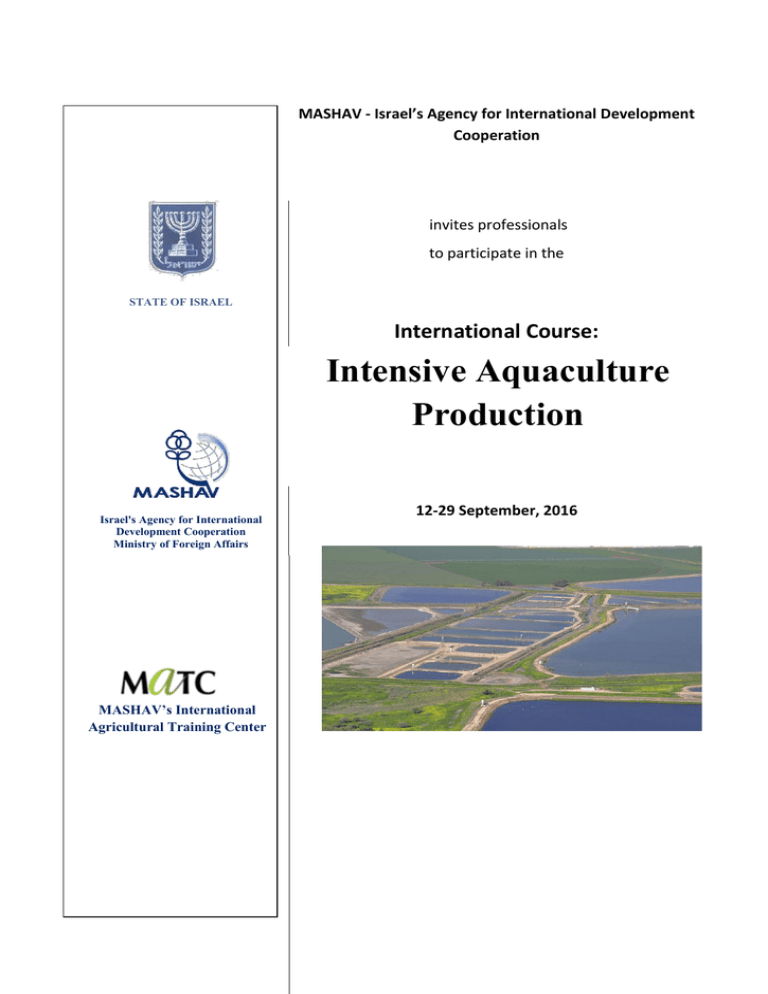
MASHAV - Israel’s Agency for International Development Cooperation invites professionals to participate in the STATE OF ISRAEL International Course: Intensive Aquaculture Production Israel's Agency for International Development Cooperation Ministry of Foreign Affairs MASHAV’s International Agricultural Training Center 12-29 September, 2016 About the Course Background The fisheries and aquaculture sector play a significant role in eliminating hunger, promoting health and reducing poverty. In 2011, the world consumed 132 million tons of fish, and demand is expected to rise. Fish is extremely nutritious – a vital source of protein and essential nutrients, especially for many poorer members of our global community. Fisheries and aquaculture is a source not just of health but also of wealth. Employment in the sector has grown faster than the world’s population. The sector provides jobs to tens of millions and supports the livelihoods of hundreds of millions. Fish continues to be one of the most-traded food commodities worldwide. It is especially important for developing countries, sometimes worth half the total value of their traded commodities. In 2008, almost 45 million people were directly engaged in the sector. Women represent half of those involved, altogether, including family dependents of those workers, fishery and aquaculture support the livelihoods of about 540 million people (8% of the world population). Global fish production continues to outpace world population growth, and aquaculture remains one of the fastest-growing food producing sectors. The establishment of the fishery sector and growth of aquaculture production in Israel closely parallels the development of the State of Israel. Israeli aquaculture has, from the outset, benefited from organizational support and close relationships between government, business, and research institutions. Economic changes, privatization, ecological concerns, and the introduction of new technologies, practices and species have expanded from the basic traditional cooperative (kibbutz) farm that produced one or two species to large multimillion-dollar projects dealing with a multitude of species production. Aims The course aims to share Israel’s experience and applied research, taking into consideration the adaptability of methods and technologies, to meet local conditions in each participant's country. After completion of this course, participants will be able to understand and consequently implement the knowledge gained to the benefit of the aquaculture industry in their respective countries Main Subjects The course will include professional lectures and visits on the following subjects: Production planning Inland and coastal fisheries Water quality Nutrition Disease control Technologies and equipment Food safety Economic aspects and marketing Please note that topics related to Shellfish production (shrimp, clams, oysters, mussels, prawns and crayfish) will not be covered by the program 2 Application Application Requirements The training is geared towards professionals involved in aquaculture production. Candidates should hold an academic degree in related disciplines and at least two years of professional work experience. A full command of English is required. Application forms Application forms and other information may be obtained at the nearest Israeli mission or at MASHAV’s website: http://mashav.mfa.gov.il/MFA/mashav/Courses/Pages/default.aspx. Completed application forms, including the medical form, should be sent to the relevant Israeli mission in the respective country. General Information The course will be held at MATC Agricultural Training Center Located at Kibbutz Hotel Shefayim, situated 20 km north of Tel Aviv near the coastal city of Netanya. Participants will be accommodated at hotel Kibbutz Shefayim in double rooms (two participants per room). Arrival and Departure Arrival date: Opening date: Closing date: Departure date: September 12th 2016 September 13th 2016 September 28th 2016 September 29th 2016 Participants must arrive at the training center on the arrival date, and leave on the departure date. Early arrivals/late departures if required, must be arranged by the participants themselves, directly with the hotel/center, and must be paid for by the participant him/herself. Location and Accommodation MASHAV awards a limited number of scholarships. The scholarship covers the cost of the training program including lectures and field visits, full board accommodation in double rooms (two participants per room), health insurance (see below) and transfers to and from the airport. Airfares and daily allowance are not included in the scholarship. Health Services Medical insurance covers medical services and hospitalization in case of emergency. It does not cover the treatment of chronic or serious diseases, specific medications taken by the participant on a regular basis, dental care and eyeglasses. Health authorities recommend that visitors to Israel make sure they have been inoculated against tetanus in the last ten years. Subject to the full binding policy conditions. Participants are responsible for all other expenses. 3 About MASHAV MASHAV – Israel’s Agency for International Development Cooperation is dedicated to providing developing countries with the best of Israel’s experience in development and planning. As a member of the family of nations, The State of Israel is committed to fulfilling its responsibility to contribute to the fight against poverty and to the global efforts to achieve sustainable development. MASHAV, representing Israel and its people, focuses its efforts on capacity building, sharing relevant expertise accumulated during Israel's own development experience to empower governments, communities and individuals to improve their own lives. MASHAV’s approach is to ensure social, economic and environmental sustainable development, and is taking active part in the international community’s process of shaping the Post-2015 Agenda, to define the new set of the global Sustainable Development Goals (SDGs). MASHAV’s activities focus primarily on areas in which Israel has a competitive advantage, including agriculture and rural development; water resources management; entrepreneurship and innovation; community development; medicine and public health, empowerment of women and education. Professional programs are based on a “train the trainers” approach to institutional and human capacity building, and are conducted both in Israel and abroad. Project development is supported by the seconding of short and longterm experts, as well as on-site interventions. Since its establishment, MASHAV has promoted the centrality of human resource enrichment and institutional capacity building in the development process – an approach which has attained global consensus. http://mashav.mfa.gov.il https://www.facebook.com/MASHAVisrael About MATC MATC - MASHAV’s International Agricultural Training Center - specializes since 1963 in human capacity building and training programs in the fields of agriculture, water management, environment and rural development. MATC conducts international, regional and country specific courses as well as professional study-tours, workshops and conferences based on Israeli agricultural know-how, innovation, and development experience. Its training programs, conducted in English, Spanish, French, Russian, and Arabic, are specifically designed to improve agricultural production in developing countries, to promote food security and to create partnerships as well as ongoing international cooperation for sustainable development. MATC works in close cooperation with Israel's Ministry of Agriculture and Rural Development and its Center for International Agricultural Development Cooperation - CINADCO. For further information, please contact: MATC - English Division Hotel Shefayim 60990, Israel Tel: 972-9-9595729/30 Fax: 972-99595733 E-mail: [email protected]; [email protected] http://mashav.mfa.gov.il 4
